Psychology Resume Examples

Mar 25, 2025
|
12 min read
Master the art of crafting a psychology resume that will psych out the competition and get you noticed by employers. Discover tips on showcasing your expertise, education, and experience to stand out in the field of psychology.
Rated by 348 people
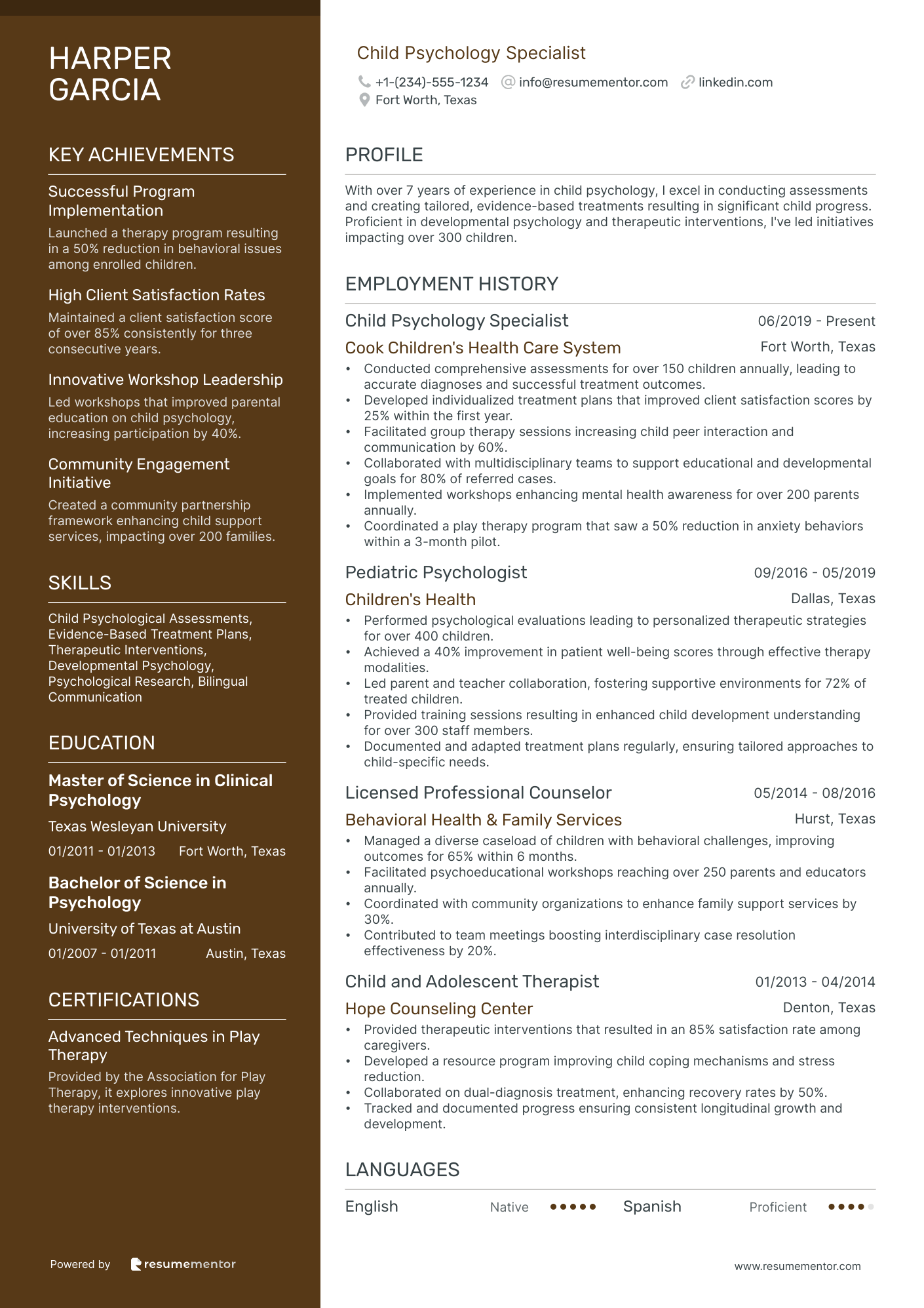
Child Psychology Specialist
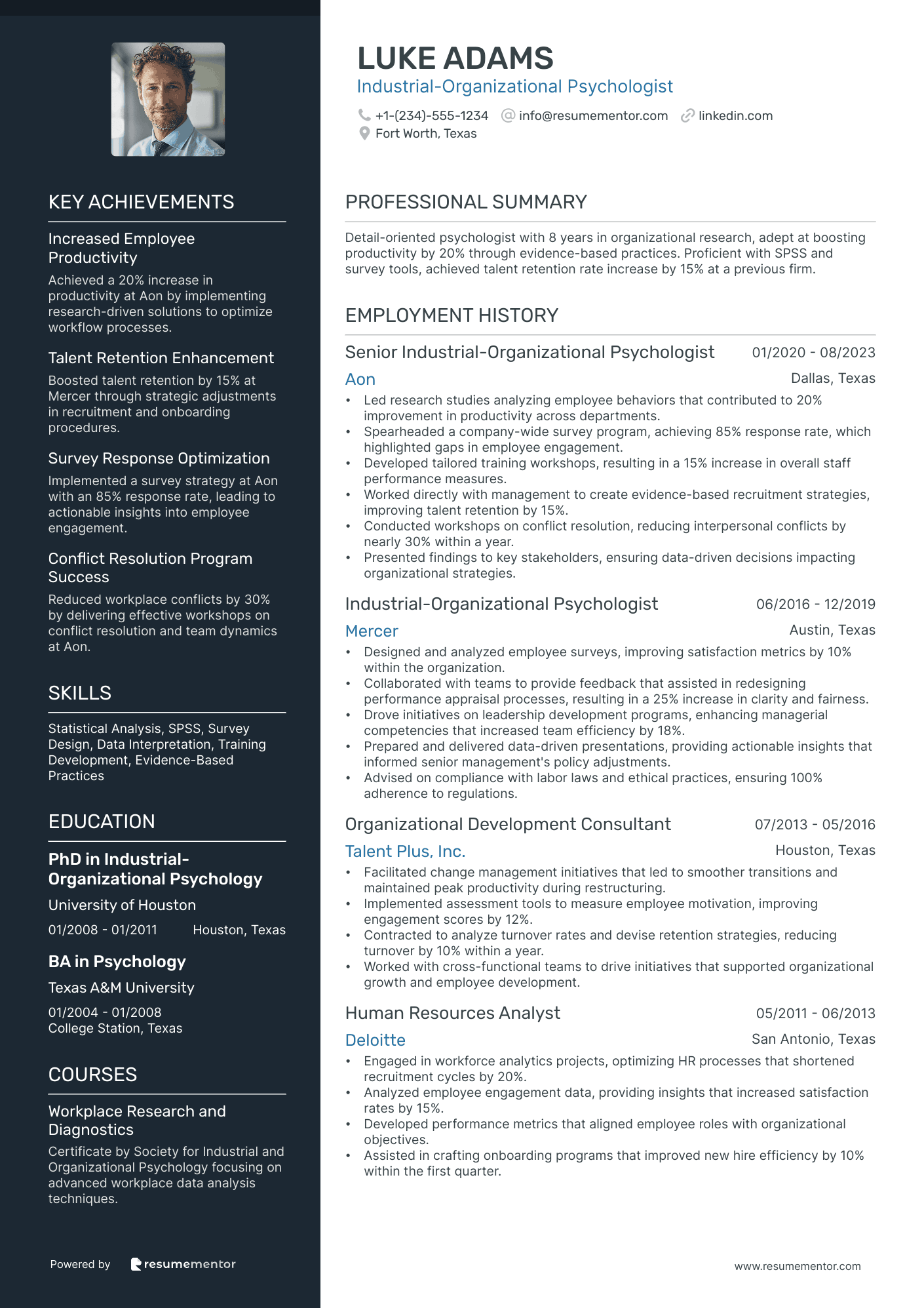
Industrial-Organizational Psychologist
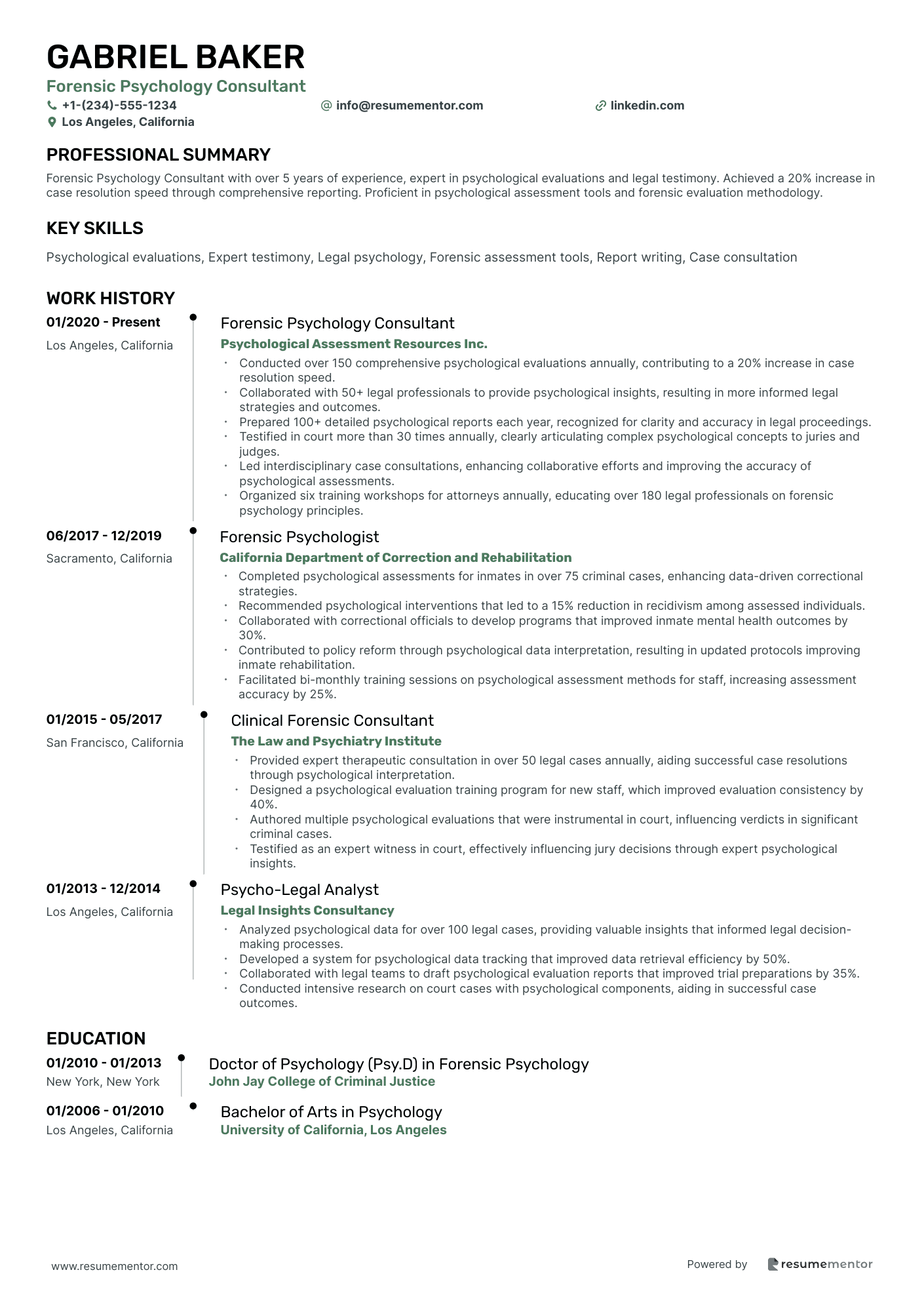
Forensic Psychology Consultant
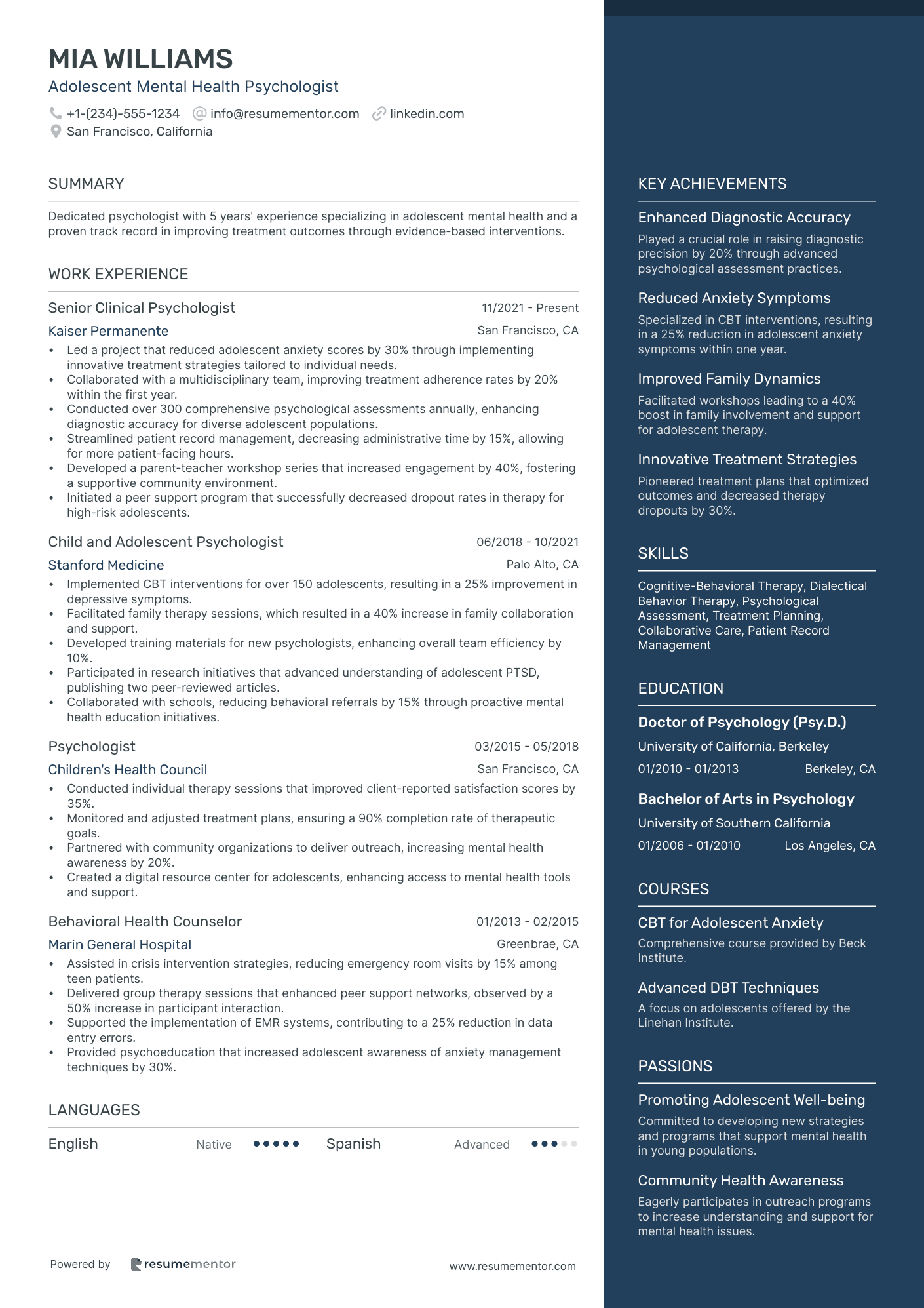
Adolescent Mental Health Psychologist
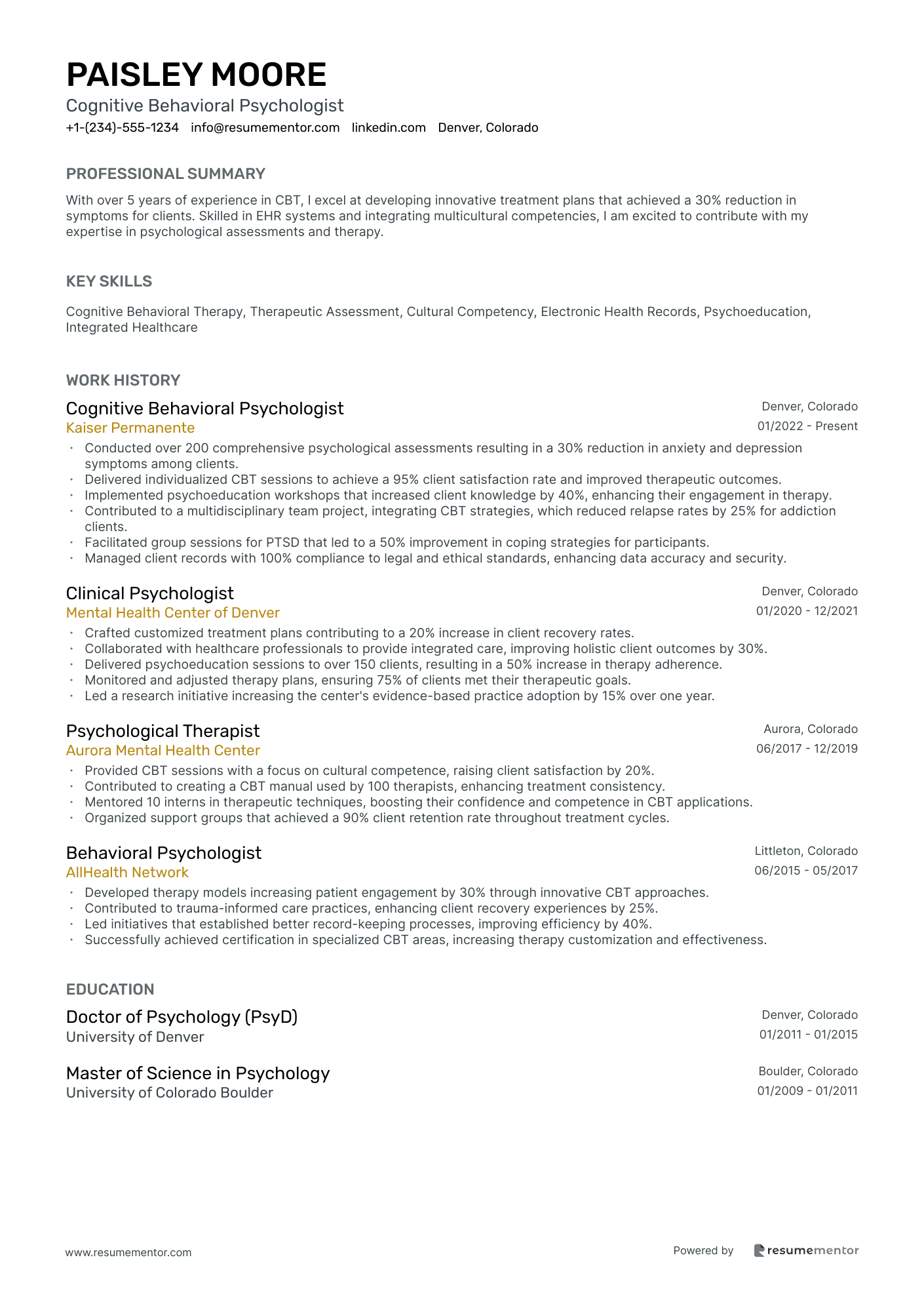
Cognitive Behavioral Psychologist
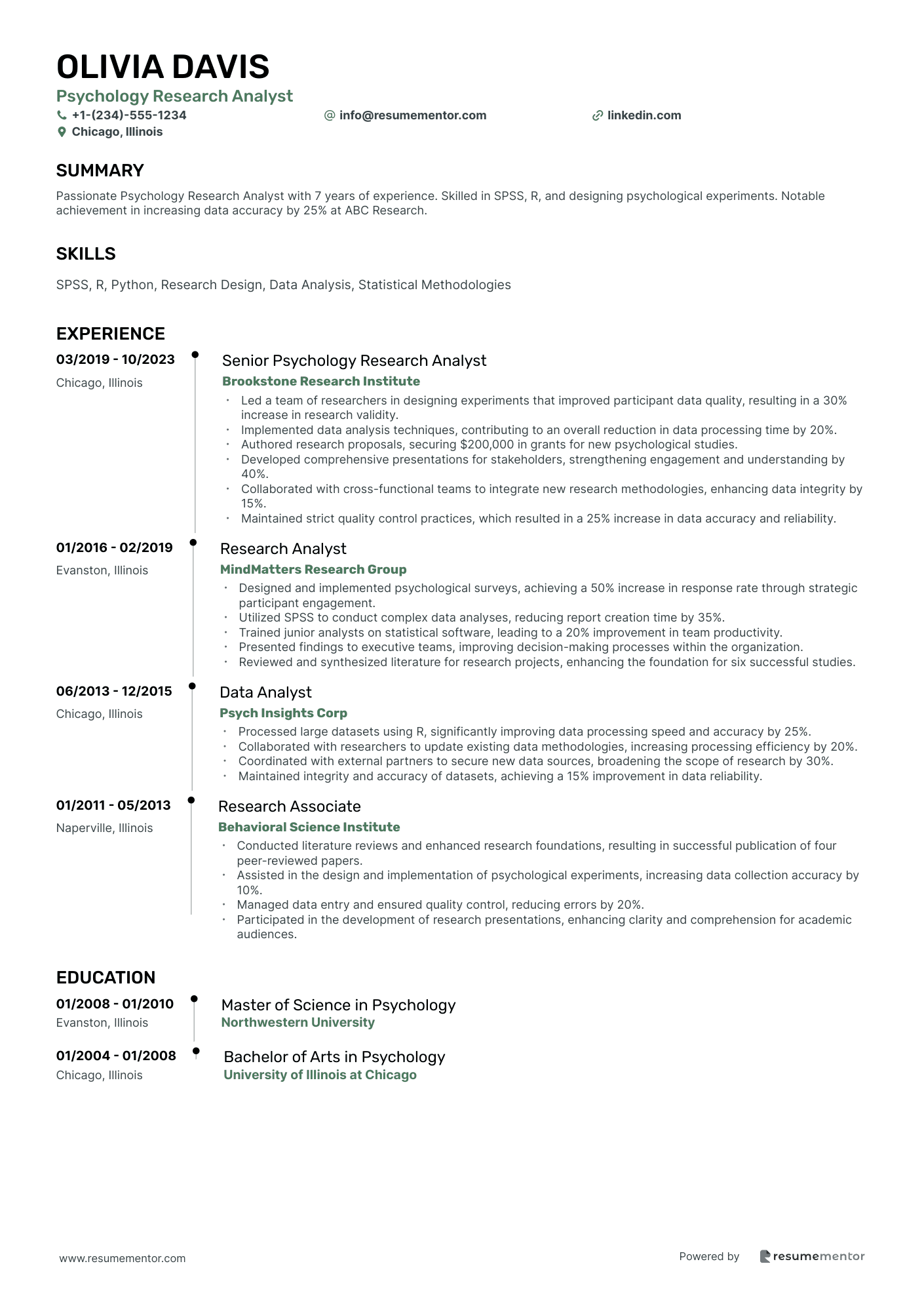
Psychology Research Analyst
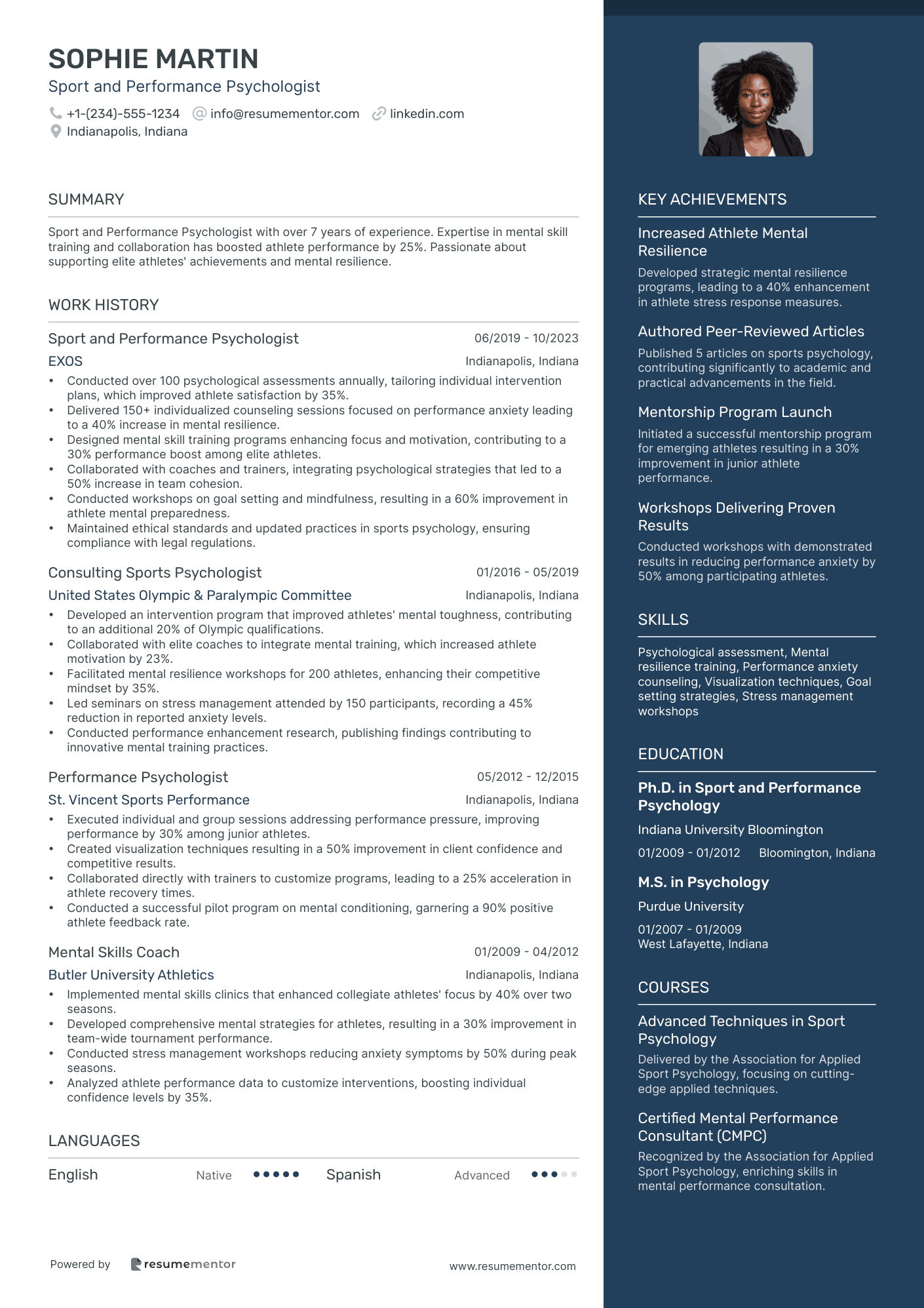
Sport and Performance Psychologist
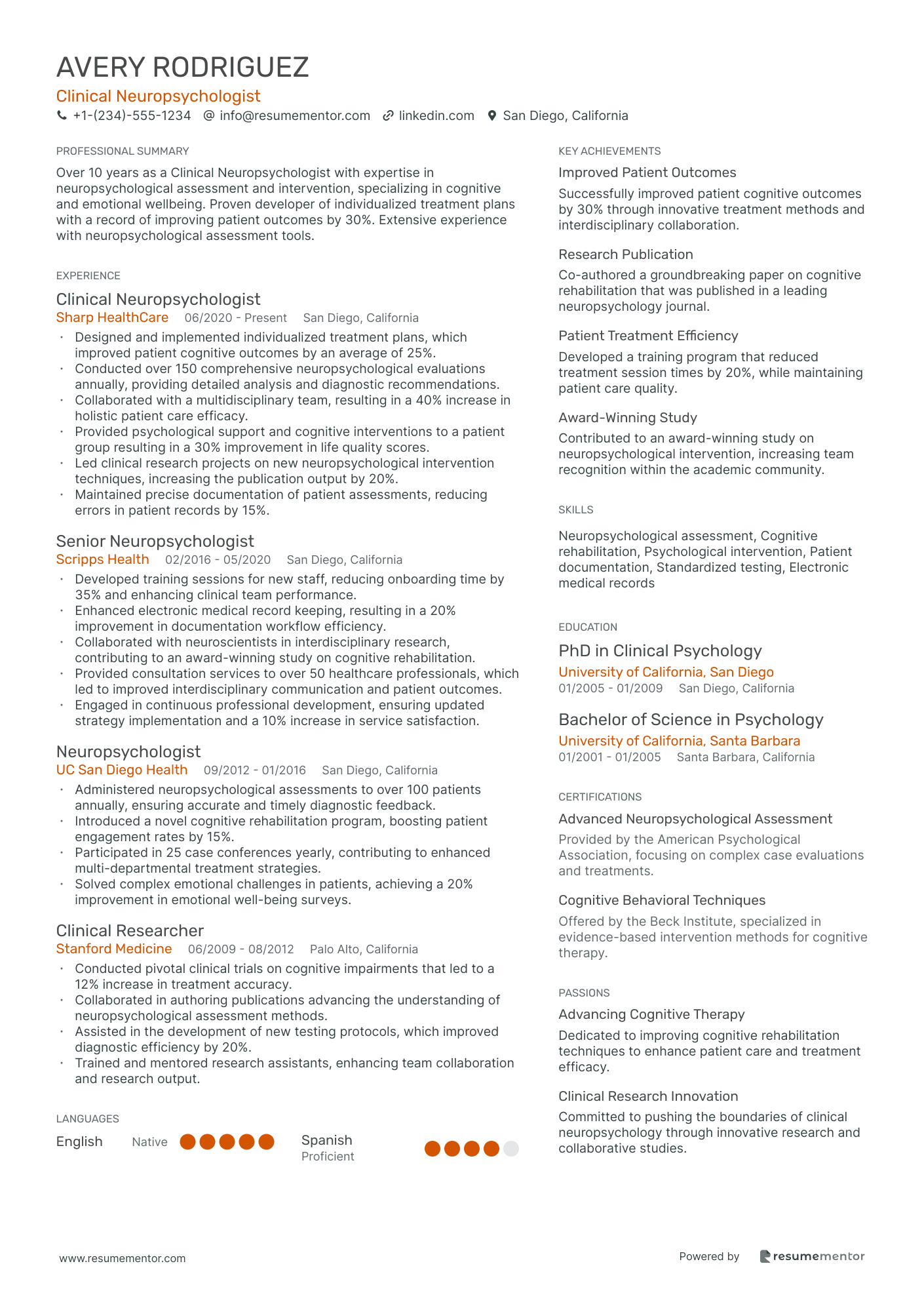
Clinical Neuropsychologist
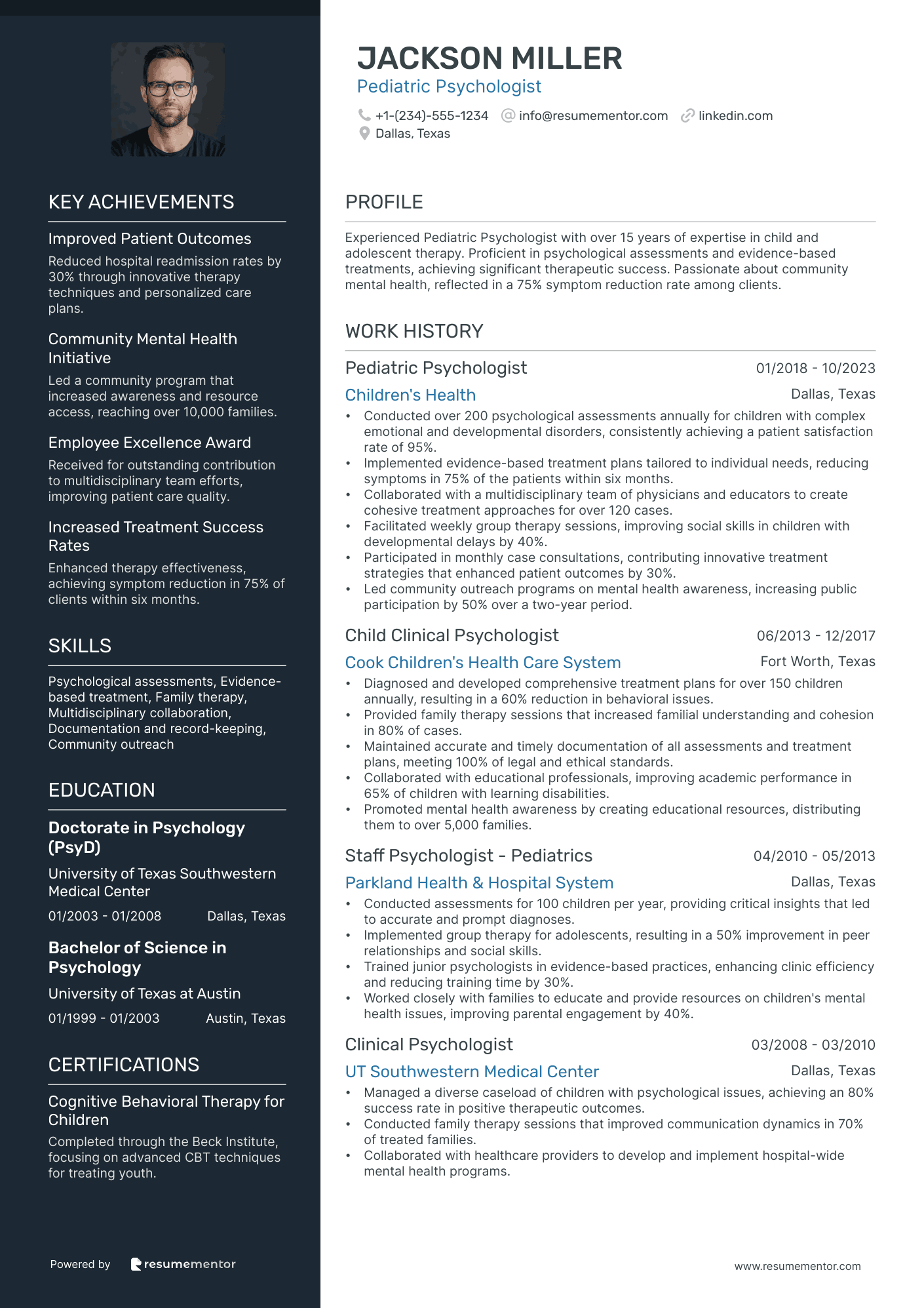
Pediatric Psychologist
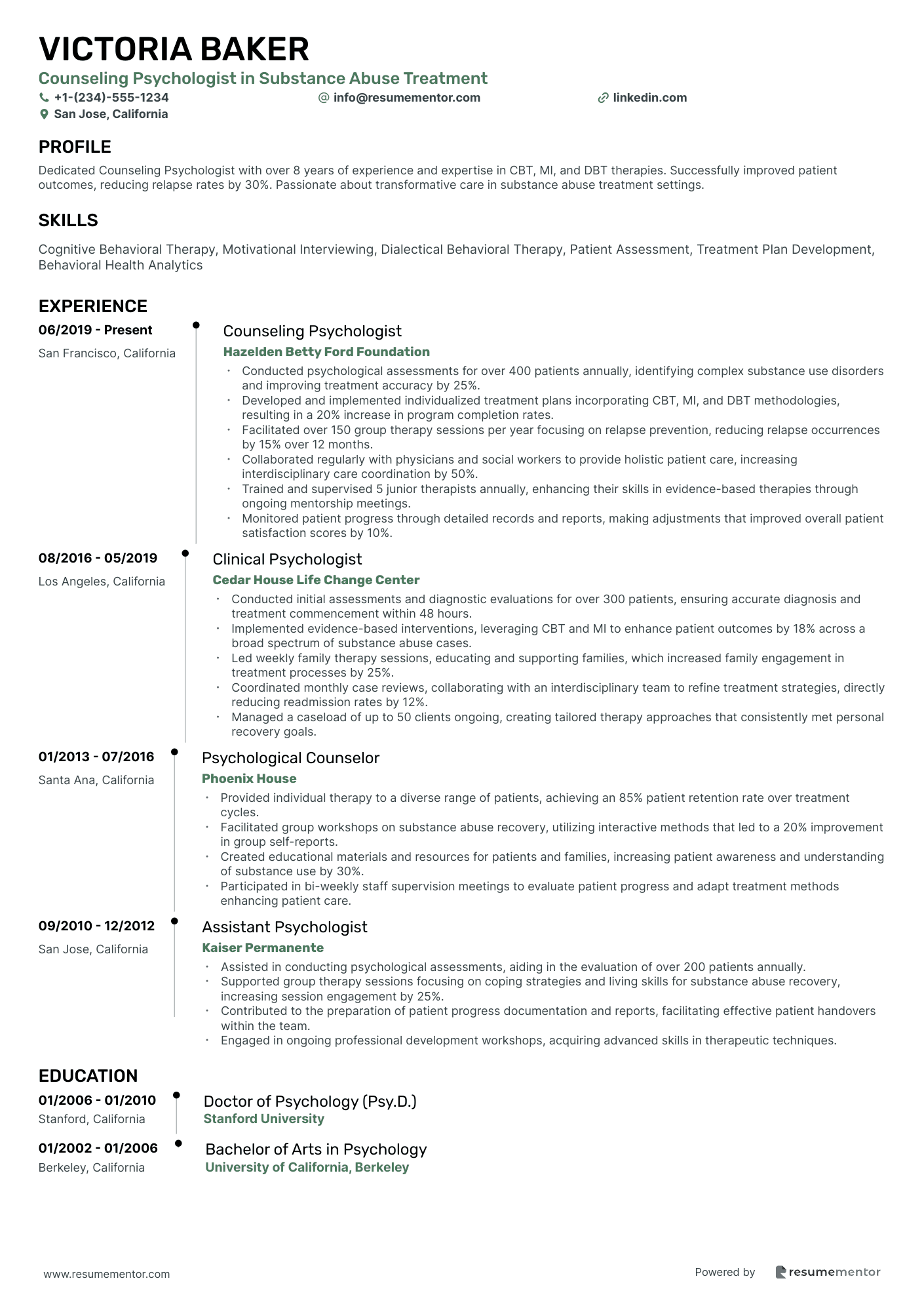
Counseling Psychologist in Substance Abuse Treatment

Child Psychology Specialist resume sample
- •Conducted comprehensive assessments for over 150 children annually, leading to accurate diagnoses and successful treatment outcomes.
- •Developed individualized treatment plans that improved client satisfaction scores by 25% within the first year.
- •Facilitated group therapy sessions increasing child peer interaction and communication by 60%.
- •Collaborated with multidisciplinary teams to support educational and developmental goals for 80% of referred cases.
- •Implemented workshops enhancing mental health awareness for over 200 parents annually.
- •Coordinated a play therapy program that saw a 50% reduction in anxiety behaviors within a 3-month pilot.
- •Performed psychological evaluations leading to personalized therapeutic strategies for over 400 children.
- •Achieved a 40% improvement in patient well-being scores through effective therapy modalities.
- •Led parent and teacher collaboration, fostering supportive environments for 72% of treated children.
- •Provided training sessions resulting in enhanced child development understanding for over 300 staff members.
- •Documented and adapted treatment plans regularly, ensuring tailored approaches to child-specific needs.
- •Managed a diverse caseload of children with behavioral challenges, improving outcomes for 65% within 6 months.
- •Facilitated psychoeducational workshops reaching over 250 parents and educators annually.
- •Coordinated with community organizations to enhance family support services by 30%.
- •Contributed to team meetings boosting interdisciplinary case resolution effectiveness by 20%.
- •Provided therapeutic interventions that resulted in an 85% satisfaction rate among caregivers.
- •Developed a resource program improving child coping mechanisms and stress reduction.
- •Collaborated on dual-diagnosis treatment, enhancing recovery rates by 50%.
- •Tracked and documented progress ensuring consistent longitudinal growth and development.
Industrial-Organizational Psychologist resume sample
- •Led research studies analyzing employee behaviors that contributed to 20% improvement in productivity across departments.
- •Spearheaded a company-wide survey program, achieving 85% response rate, which highlighted gaps in employee engagement.
- •Developed tailored training workshops, resulting in a 15% increase in overall staff performance measures.
- •Worked directly with management to create evidence-based recruitment strategies, improving talent retention by 15%.
- •Conducted workshops on conflict resolution, reducing interpersonal conflicts by nearly 30% within a year.
- •Presented findings to key stakeholders, ensuring data-driven decisions impacting organizational strategies.
- •Designed and analyzed employee surveys, improving satisfaction metrics by 10% within the organization.
- •Collaborated with teams to provide feedback that assisted in redesigning performance appraisal processes, resulting in a 25% increase in clarity and fairness.
- •Drove initiatives on leadership development programs, enhancing managerial competencies that increased team efficiency by 18%.
- •Prepared and delivered data-driven presentations, providing actionable insights that informed senior management's policy adjustments.
- •Advised on compliance with labor laws and ethical practices, ensuring 100% adherence to regulations.
- •Facilitated change management initiatives that led to smoother transitions and maintained peak productivity during restructuring.
- •Implemented assessment tools to measure employee motivation, improving engagement scores by 12%.
- •Contracted to analyze turnover rates and devise retention strategies, reducing turnover by 10% within a year.
- •Worked with cross-functional teams to drive initiatives that supported organizational growth and employee development.
- •Engaged in workforce analytics projects, optimizing HR processes that shortened recruitment cycles by 20%.
- •Analyzed employee engagement data, providing insights that increased satisfaction rates by 15%.
- •Developed performance metrics that aligned employee roles with organizational objectives.
- •Assisted in crafting onboarding programs that improved new hire efficiency by 10% within the first quarter.
Forensic Psychology Consultant resume sample
- •Conducted over 150 comprehensive psychological evaluations annually, contributing to a 20% increase in case resolution speed.
- •Collaborated with 50+ legal professionals to provide psychological insights, resulting in more informed legal strategies and outcomes.
- •Prepared 100+ detailed psychological reports each year, recognized for clarity and accuracy in legal proceedings.
- •Testified in court more than 30 times annually, clearly articulating complex psychological concepts to juries and judges.
- •Led interdisciplinary case consultations, enhancing collaborative efforts and improving the accuracy of psychological assessments.
- •Organized six training workshops for attorneys annually, educating over 180 legal professionals on forensic psychology principles.
- •Completed psychological assessments for inmates in over 75 criminal cases, enhancing data-driven correctional strategies.
- •Recommended psychological interventions that led to a 15% reduction in recidivism among assessed individuals.
- •Collaborated with correctional officials to develop programs that improved inmate mental health outcomes by 30%.
- •Contributed to policy reform through psychological data interpretation, resulting in updated protocols improving inmate rehabilitation.
- •Facilitated bi-monthly training sessions on psychological assessment methods for staff, increasing assessment accuracy by 25%.
- •Provided expert therapeutic consultation in over 50 legal cases annually, aiding successful case resolutions through psychological interpretation.
- •Designed a psychological evaluation training program for new staff, which improved evaluation consistency by 40%.
- •Authored multiple psychological evaluations that were instrumental in court, influencing verdicts in significant criminal cases.
- •Testified as an expert witness in court, effectively influencing jury decisions through expert psychological insights.
- •Analyzed psychological data for over 100 legal cases, providing valuable insights that informed legal decision-making processes.
- •Developed a system for psychological data tracking that improved data retrieval efficiency by 50%.
- •Collaborated with legal teams to draft psychological evaluation reports that improved trial preparations by 35%.
- •Conducted intensive research on court cases with psychological components, aiding in successful case outcomes.
Adolescent Mental Health Psychologist resume sample
- •Led a project that reduced adolescent anxiety scores by 30% through implementing innovative treatment strategies tailored to individual needs.
- •Collaborated with a multidisciplinary team, improving treatment adherence rates by 20% within the first year.
- •Conducted over 300 comprehensive psychological assessments annually, enhancing diagnostic accuracy for diverse adolescent populations.
- •Streamlined patient record management, decreasing administrative time by 15%, allowing for more patient-facing hours.
- •Developed a parent-teacher workshop series that increased engagement by 40%, fostering a supportive community environment.
- •Initiated a peer support program that successfully decreased dropout rates in therapy for high-risk adolescents.
- •Implemented CBT interventions for over 150 adolescents, resulting in a 25% improvement in depressive symptoms.
- •Facilitated family therapy sessions, which resulted in a 40% increase in family collaboration and support.
- •Developed training materials for new psychologists, enhancing overall team efficiency by 10%.
- •Participated in research initiatives that advanced understanding of adolescent PTSD, publishing two peer-reviewed articles.
- •Collaborated with schools, reducing behavioral referrals by 15% through proactive mental health education initiatives.
- •Conducted individual therapy sessions that improved client-reported satisfaction scores by 35%.
- •Monitored and adjusted treatment plans, ensuring a 90% completion rate of therapeutic goals.
- •Partnered with community organizations to deliver outreach, increasing mental health awareness by 20%.
- •Created a digital resource center for adolescents, enhancing access to mental health tools and support.
- •Assisted in crisis intervention strategies, reducing emergency room visits by 15% among teen patients.
- •Delivered group therapy sessions that enhanced peer support networks, observed by a 50% increase in participant interaction.
- •Supported the implementation of EMR systems, contributing to a 25% reduction in data entry errors.
- •Provided psychoeducation that increased adolescent awareness of anxiety management techniques by 30%.
Cognitive Behavioral Psychologist resume sample
- •Conducted over 200 comprehensive psychological assessments resulting in a 30% reduction in anxiety and depression symptoms among clients.
- •Delivered individualized CBT sessions to achieve a 95% client satisfaction rate and improved therapeutic outcomes.
- •Implemented psychoeducation workshops that increased client knowledge by 40%, enhancing their engagement in therapy.
- •Contributed to a multidisciplinary team project, integrating CBT strategies, which reduced relapse rates by 25% for addiction clients.
- •Facilitated group sessions for PTSD that led to a 50% improvement in coping strategies for participants.
- •Managed client records with 100% compliance to legal and ethical standards, enhancing data accuracy and security.
- •Crafted customized treatment plans contributing to a 20% increase in client recovery rates.
- •Collaborated with healthcare professionals to provide integrated care, improving holistic client outcomes by 30%.
- •Delivered psychoeducation sessions to over 150 clients, resulting in a 50% increase in therapy adherence.
- •Monitored and adjusted therapy plans, ensuring 75% of clients met their therapeutic goals.
- •Led a research initiative increasing the center's evidence-based practice adoption by 15% over one year.
- •Provided CBT sessions with a focus on cultural competence, raising client satisfaction by 20%.
- •Contributed to creating a CBT manual used by 100 therapists, enhancing treatment consistency.
- •Mentored 10 interns in therapeutic techniques, boosting their confidence and competence in CBT applications.
- •Organized support groups that achieved a 90% client retention rate throughout treatment cycles.
- •Developed therapy models increasing patient engagement by 30% through innovative CBT approaches.
- •Contributed to trauma-informed care practices, enhancing client recovery experiences by 25%.
- •Led initiatives that established better record-keeping processes, improving efficiency by 40%.
- •Successfully achieved certification in specialized CBT areas, increasing therapy customization and effectiveness.
Psychology Research Analyst resume sample
- •Led a team of researchers in designing experiments that improved participant data quality, resulting in a 30% increase in research validity.
- •Implemented data analysis techniques, contributing to an overall reduction in data processing time by 20%.
- •Authored research proposals, securing $200,000 in grants for new psychological studies.
- •Developed comprehensive presentations for stakeholders, strengthening engagement and understanding by 40%.
- •Collaborated with cross-functional teams to integrate new research methodologies, enhancing data integrity by 15%.
- •Maintained strict quality control practices, which resulted in a 25% increase in data accuracy and reliability.
- •Designed and implemented psychological surveys, achieving a 50% increase in response rate through strategic participant engagement.
- •Utilized SPSS to conduct complex data analyses, reducing report creation time by 35%.
- •Trained junior analysts on statistical software, leading to a 20% improvement in team productivity.
- •Presented findings to executive teams, improving decision-making processes within the organization.
- •Reviewed and synthesized literature for research projects, enhancing the foundation for six successful studies.
- •Processed large datasets using R, significantly improving data processing speed and accuracy by 25%.
- •Collaborated with researchers to update existing data methodologies, increasing processing efficiency by 20%.
- •Coordinated with external partners to secure new data sources, broadening the scope of research by 30%.
- •Maintained integrity and accuracy of datasets, achieving a 15% improvement in data reliability.
- •Conducted literature reviews and enhanced research foundations, resulting in successful publication of four peer-reviewed papers.
- •Assisted in the design and implementation of psychological experiments, increasing data collection accuracy by 10%.
- •Managed data entry and ensured quality control, reducing errors by 20%.
- •Participated in the development of research presentations, enhancing clarity and comprehension for academic audiences.
Sport and Performance Psychologist resume sample
- •Conducted over 100 psychological assessments annually, tailoring individual intervention plans, which improved athlete satisfaction by 35%.
- •Delivered 150+ individualized counseling sessions focused on performance anxiety leading to a 40% increase in mental resilience.
- •Designed mental skill training programs enhancing focus and motivation, contributing to a 30% performance boost among elite athletes.
- •Collaborated with coaches and trainers, integrating psychological strategies that led to a 50% increase in team cohesion.
- •Conducted workshops on goal setting and mindfulness, resulting in a 60% improvement in athlete mental preparedness.
- •Maintained ethical standards and updated practices in sports psychology, ensuring compliance with legal regulations.
- •Developed an intervention program that improved athletes' mental toughness, contributing to an additional 20% of Olympic qualifications.
- •Collaborated with elite coaches to integrate mental training, which increased athlete motivation by 23%.
- •Facilitated mental resilience workshops for 200 athletes, enhancing their competitive mindset by 35%.
- •Led seminars on stress management attended by 150 participants, recording a 45% reduction in reported anxiety levels.
- •Conducted performance enhancement research, publishing findings contributing to innovative mental training practices.
- •Executed individual and group sessions addressing performance pressure, improving performance by 30% among junior athletes.
- •Created visualization techniques resulting in a 50% improvement in client confidence and competitive results.
- •Collaborated directly with trainers to customize programs, leading to a 25% acceleration in athlete recovery times.
- •Conducted a successful pilot program on mental conditioning, garnering a 90% positive athlete feedback rate.
- •Implemented mental skills clinics that enhanced collegiate athletes' focus by 40% over two seasons.
- •Developed comprehensive mental strategies for athletes, resulting in a 30% improvement in team-wide tournament performance.
- •Conducted stress management workshops reducing anxiety symptoms by 50% during peak seasons.
- •Analyzed athlete performance data to customize interventions, boosting individual confidence levels by 35%.
Clinical Neuropsychologist resume sample
- •Designed and implemented individualized treatment plans, which improved patient cognitive outcomes by an average of 25%.
- •Conducted over 150 comprehensive neuropsychological evaluations annually, providing detailed analysis and diagnostic recommendations.
- •Collaborated with a multidisciplinary team, resulting in a 40% increase in holistic patient care efficacy.
- •Provided psychological support and cognitive interventions to a patient group resulting in a 30% improvement in life quality scores.
- •Led clinical research projects on new neuropsychological intervention techniques, increasing the publication output by 20%.
- •Maintained precise documentation of patient assessments, reducing errors in patient records by 15%.
- •Developed training sessions for new staff, reducing onboarding time by 35% and enhancing clinical team performance.
- •Enhanced electronic medical record keeping, resulting in a 20% improvement in documentation workflow efficiency.
- •Collaborated with neuroscientists in interdisciplinary research, contributing to an award-winning study on cognitive rehabilitation.
- •Provided consultation services to over 50 healthcare professionals, which led to improved interdisciplinary communication and patient outcomes.
- •Engaged in continuous professional development, ensuring updated strategy implementation and a 10% increase in service satisfaction.
- •Administered neuropsychological assessments to over 100 patients annually, ensuring accurate and timely diagnostic feedback.
- •Introduced a novel cognitive rehabilitation program, boosting patient engagement rates by 15%.
- •Participated in 25 case conferences yearly, contributing to enhanced multi-departmental treatment strategies.
- •Solved complex emotional challenges in patients, achieving a 20% improvement in emotional well-being surveys.
- •Conducted pivotal clinical trials on cognitive impairments that led to a 12% increase in treatment accuracy.
- •Collaborated in authoring publications advancing the understanding of neuropsychological assessment methods.
- •Assisted in the development of new testing protocols, which improved diagnostic efficiency by 20%.
- •Trained and mentored research assistants, enhancing team collaboration and research output.
Pediatric Psychologist resume sample
- •Conducted over 200 psychological assessments annually for children with complex emotional and developmental disorders, consistently achieving a patient satisfaction rate of 95%.
- •Implemented evidence-based treatment plans tailored to individual needs, reducing symptoms in 75% of the patients within six months.
- •Collaborated with a multidisciplinary team of physicians and educators to create cohesive treatment approaches for over 120 cases.
- •Facilitated weekly group therapy sessions, improving social skills in children with developmental delays by 40%.
- •Participated in monthly case consultations, contributing innovative treatment strategies that enhanced patient outcomes by 30%.
- •Led community outreach programs on mental health awareness, increasing public participation by 50% over a two-year period.
- •Diagnosed and developed comprehensive treatment plans for over 150 children annually, resulting in a 60% reduction in behavioral issues.
- •Provided family therapy sessions that increased familial understanding and cohesion in 80% of cases.
- •Maintained accurate and timely documentation of all assessments and treatment plans, meeting 100% of legal and ethical standards.
- •Collaborated with educational professionals, improving academic performance in 65% of children with learning disabilities.
- •Promoted mental health awareness by creating educational resources, distributing them to over 5,000 families.
- •Conducted assessments for 100 children per year, providing critical insights that led to accurate and prompt diagnoses.
- •Implemented group therapy for adolescents, resulting in a 50% improvement in peer relationships and social skills.
- •Trained junior psychologists in evidence-based practices, enhancing clinic efficiency and reducing training time by 30%.
- •Worked closely with families to educate and provide resources on children's mental health issues, improving parental engagement by 40%.
- •Managed a diverse caseload of children with psychological issues, achieving an 80% success rate in positive therapeutic outcomes.
- •Conducted family therapy sessions that improved communication dynamics in 70% of treated families.
- •Collaborated with healthcare providers to develop and implement hospital-wide mental health programs.
Counseling Psychologist in Substance Abuse Treatment resume sample
- •Conducted psychological assessments for over 400 patients annually, identifying complex substance use disorders and improving treatment accuracy by 25%.
- •Developed and implemented individualized treatment plans incorporating CBT, MI, and DBT methodologies, resulting in a 20% increase in program completion rates.
- •Facilitated over 150 group therapy sessions per year focusing on relapse prevention, reducing relapse occurrences by 15% over 12 months.
- •Collaborated regularly with physicians and social workers to provide holistic patient care, increasing interdisciplinary care coordination by 50%.
- •Trained and supervised 5 junior therapists annually, enhancing their skills in evidence-based therapies through ongoing mentorship meetings.
- •Monitored patient progress through detailed records and reports, making adjustments that improved overall patient satisfaction scores by 10%.
- •Conducted initial assessments and diagnostic evaluations for over 300 patients, ensuring accurate diagnosis and treatment commencement within 48 hours.
- •Implemented evidence-based interventions, leveraging CBT and MI to enhance patient outcomes by 18% across a broad spectrum of substance abuse cases.
- •Led weekly family therapy sessions, educating and supporting families, which increased family engagement in treatment processes by 25%.
- •Coordinated monthly case reviews, collaborating with an interdisciplinary team to refine treatment strategies, directly reducing readmission rates by 12%.
- •Managed a caseload of up to 50 clients ongoing, creating tailored therapy approaches that consistently met personal recovery goals.
- •Provided individual therapy to a diverse range of patients, achieving an 85% patient retention rate over treatment cycles.
- •Facilitated group workshops on substance abuse recovery, utilizing interactive methods that led to a 20% improvement in group self-reports.
- •Created educational materials and resources for patients and families, increasing patient awareness and understanding of substance use by 30%.
- •Participated in bi-weekly staff supervision meetings to evaluate patient progress and adapt treatment methods enhancing patient care.
- •Assisted in conducting psychological assessments, aiding in the evaluation of over 200 patients annually.
- •Supported group therapy sessions focusing on coping strategies and living skills for substance abuse recovery, increasing session engagement by 25%.
- •Contributed to the preparation of patient progress documentation and reports, facilitating effective patient handovers within the team.
- •Engaged in ongoing professional development workshops, acquiring advanced skills in therapeutic techniques.
Crafting the perfect psychology resume is like piecing together the intricate puzzle of your career. While you have a deep understanding of human behavior, putting those skills and experiences onto paper can sometimes feel intimidating. Presenting your clinical expertise and insights effectively is crucial, whether you're just starting or looking to advance.
Think of your resume as more than a list of jobs—it's a reflection of your career journey and your ability to analyze complex psychological issues. Highlighting your strengths in research, diagnostics, and therapeutic techniques is essential, but organizing these details into a compelling format can be challenging. That's where using a resume template comes in handy. A well-structured format allows you to focus on showcasing what truly matters—your unique capabilities. Explore these resume templates to find one that fits your needs perfectly.
Crafting an effective resume opens up opportunities and connects you with potential employers who value your psychological expertise. This is your chance to demonstrate not just your past achievements, but also what you can bring to the table moving forward. Remember, your problem-solving skills and understanding of others are your superpowers. With the right tools and approach, you can craft a resume that makes your psychology career shine.
Key Takeaways
- Your psychology resume should present your clinical expertise, human behavior understanding, and problem-solving skills in a compelling format to highlight your unique capabilities effectively.
- Start with clear contact information, followed by a professional summary tailored to align with the job, and include education details such as degree types, majors, and certifications.
- Emphasize your work experience by showcasing the roles where you've applied psychological principles, quantifying your achievements to demonstrate tangible results.
- Choose the right resume format that best showcases your background, whether chronological for a steady job history or functional for those pivoting into psychology, ensuring readability and professionalism.
- Include sections like skills, education, certifications, and additional aspects such as languages, hobbies, or volunteer work to provide a well-rounded view of your qualifications and personal attributes.
What to focus on when writing your psychology resume
A psychology resume should effectively convey your expertise and experience to the recruiter, clearly reflecting your understanding of human behavior, research capabilities, and practical application of psychological principles. This ensures your knowledge and skills in clinical or counseling settings are highlighted.
How to structure your psychology resume
- Contact Information — Start with your full name, phone number, email address, and LinkedIn profile to make initial contact straightforward. Including a professional email address helps establish credibility. A LinkedIn profile that aligns with your resume can provide additional insights into your professional activities and endorsements.
- Professional Summary — This section offers a snapshot of your psychology background, focusing on specializations like cognitive psychology or clinical counseling, which sets the stage for your professional identity. Tailor this section to align with the job you're applying for, emphasizing key qualifications and characteristics that match the role.
- Education — Follow with your educational background, listing your degrees in psychology, which are essential for establishing your academic foundation. Include details like institution names, degree types, majors, and graduation dates. Mention certifications or licenses, such as a Licensed Clinical Psychologist, to underscore your formal qualifications and readiness to practice.
- Work Experience — This section describes your professional history, emphasizing roles where you've applied psychological principles. Highlight accomplishments like successful therapy outcomes or leadership roles in mental health initiatives to showcase your impact in previous positions. Quantifying your achievements, when possible, can provide clearer evidence of your expertise and capability.
- Skills — Complement your work experience with a skills section that includes specialized abilities like psychological assessment, counseling techniques, and research methodologies. These skills should reflect your practical knowledge and expertise. Mentioning proficiency in psychological software or tools can give you a competitive edge and demonstrate your adaptability to modern practices.
- Research and Publications — Conclude with any significant research projects or publications where you've made noteworthy contributions. Detailing your role and the impact of the work highlights your dedication to advancing the field and staying current with new psychological findings.
The format of your resume is just as crucial as the content, ensuring it is structured in a way that is both easy to read and Applicant Tracking System (ATS) friendly—below, we'll cover each section more in-depth to help you create a compelling psychology resume.
Which resume format to choose
Crafting a standout psychology resume begins with selecting the right format to showcase your background effectively. If your job history is steady, a chronological format clearly highlights your professional journey and growth, making it easier for employers to see your progress in the field. However, if you're pivoting into psychology or bringing diverse experiences, a functional format that zeroes in on your skills and competencies can demonstrate your suitability for the role.
When it comes to presentation, the choice of font plays a subtle but significant role. Opting for modern fonts like Rubik, Lato, or Montserrat lends a contemporary feel to your resume, emphasizing your awareness of current trends and attention to detail. These fonts can give your document a fresh look, helping it stand out in a sea of traditional resumes.
Ensuring your resume is readable and consistent across devices is crucial, which is why saving it as a PDF is highly recommended. This file type preserves your formatting, ensuring that your resume appears professional and polished whether viewed on a computer, tablet, or smartphone. In terms of layout, maintaining one-inch margins all around keeps your content well-organized and accessible, allowing potential employers in the psychology field to focus on your achievements and skills without distraction.
These considerations collectively enhance your resume's impact, helping you convey the clarity, professionalism, and readiness that psychology employers value. Bringing these elements together allows you to present yourself as a strong candidate prepared to make meaningful contributions in the field.
How to write a quantifiable resume experience section
Highlighting your impactful work in psychology starts with a strong experience section, which shows employers how your past roles prepared you for new challenges. By starting with your most recent job, you allow managers to see your latest accomplishments right away, helping them grasp your career progression. Typically, focusing on the last 10-15 years of your experience is sufficient unless older roles are particularly relevant. It's important that each job title aligns with what the employer is seeking, achieved by matching the language in the job ad. Using clear action words like "developed," "implemented," or "analyzed," you detail your responsibilities and their impact. Numbers here are crucial as they precisely illustrate the tangible differences you made.
Here's an example:
- •Reduced patient relapse rates by 30% through personalized therapy plans.
- •Led a team in developing a cognitive-behavioral therapy program that increased client engagement by 40%.
- •Conducted over 200 group therapy sessions, achieving 95% positive feedback from participants.
- •Implemented a mindfulness training workshop, decreasing anxiety levels in participants by 25%.
The experience section stands out because it focuses on delivering clear and relevant achievements, helping employers quickly recognize your value. By highlighting your most recent role first, you make it straightforward for them to see your latest successes, such as reducing relapse rates and increasing client engagement. Action verbs like "led" and "implemented" underscore your proactive contributions, while specific numbers add weight to your achievements. This tailored approach ensures that your skills align with employer needs, presenting you as a perfect fit for the role.
Innovation-Focused resume experience section
An innovation-focused psychology resume experience section should clearly demonstrate your ability to bring fresh ideas and improvements to the field. Begin by describing roles or projects where you implemented creative solutions to psychological challenges. Make sure to show the outcomes of these initiatives with quantifiable results whenever possible, underscoring your problem-solving skills and the positive impact of your innovative thinking on your workplace or clients. When you share examples, focus on how you spotted opportunities for change and took proactive steps to address them.
It's essential to emphasize your ability to work well with others as you drive successful project outcomes. Discuss how your adaptability allowed you to apply forward-thinking approaches in various situations. This not only highlights your resourcefulness but also showcases your potential to contribute as a creative thinker in future roles. By weaving these elements together, your experience section will convincingly portray your capacity for innovation in psychology.
Innovation Specialist
MindBridge Innovations
June 2020 - Present
- Led a team in developing a digital tool to track patient progress, increasing therapy effectiveness by 20%.
- Redesigned client intake processes, reducing processing time by 50% and improving client satisfaction scores.
- Conducted innovative studies that resulted in five published papers influencing contemporary therapeutic techniques.
- Collaborated with tech teams to integrate virtual reality into exposure therapy, enhancing treatment outcomes.
Result-Focused resume experience section
A result-focused psychology resume experience section should clearly highlight your achievements and skills by showing a strong connection between your actions and their outcomes. Begin by identifying what you accomplished in each role and emphasize the steps you took to drive success for your team or organization. Illustrate your impact with concrete numbers, such as any awards you earned or successful initiatives you led, to give a clearer picture of your contributions.
Use strong action verbs to make your achievements stand out and ensure each bullet point aligns with the main focus of your resume. Avoid general statements and instead, highlight what makes your experiences unique, seamlessly tying them back to your psychology expertise in areas like research, patient care, data analysis, or therapy techniques.
Clinical Psychologist
ABC Therapy Center
June 2020 - Present
- Improved patient satisfaction by 20% through personalized treatment plans.
- Created a new therapeutic protocol that cut treatment times by 30%.
- Led workshops boosting mental health awareness in the community, reaching over 500 people.
- Worked with interdisciplinary teams to enhance patient outcomes, improving recovery rates by 15%.
Project-Focused resume experience section
A project-focused psychology resume experience section should highlight the projects that best showcase your skills and achievements in the field. Start by identifying key psychology projects you've worked on, either solo or as part of a team, to craft compelling entries. Describe these projects with a focus on your role and the impact you made, ensuring each bullet point is clear and concise. Use action verbs to convey your contributions and be specific about the techniques or methods employed, emphasizing project management and goal-achieving skills that are crucial for psychology roles.
Create a natural flow by making each bullet point a small narrative that ties together the challenge you faced, the actions you took, and the outcomes you achieved. This approach not only informs potential employers about your past work but also highlights your problem-solving abilities and thought processes. By focusing on the impact of your contributions within each project, you paint a full picture of your capabilities and potential value in future roles. Make sure to highlight any teamwork, innovative solutions, or leadership responsibilities that underscore your experience and effectiveness.
Clinical Research Project Coordinator
MindWorks Institute
June 2021 - March 2023
- Coordinated a team of five in conducting a comprehensive study on behavioral therapy outcomes, increasing efficiency by 20%.
- Developed a new data collection method that improved accuracy and reduced errors by 15%.
- Collaborated with university departments to implement interventional programs that enhanced participant engagement.
- Analyzed project data using SPSS, leading to a published paper in a respected psychology journal.
Efficiency-Focused resume experience section
An efficiency-focused psychology resume experience section should clearly showcase how you've enhanced processes and saved time while maintaining quality. Begin by pointing out instances where you've streamlined workflows, accelerated operations, or introduced innovative practices that benefited your organization. Use active verbs and specific metrics to highlight your impact, as using clear results like "reduced processing time by 30%" helps convey your achievements effectively. Maintain clarity and brevity, ensuring the reader quickly grasps your valuable contributions.
Each bullet should demonstrate the specific actions you took to achieve better outcomes, seamlessly connecting to the overall narrative. Avoid vague phrases like "responsible for" and focus on your concrete actions. Describe the problems you tackled, the solutions you provided, and the positive results you achieved. Ensure your experiences are relevant to the prospective job's requirements to highlight your applicable skills. This structured and interconnected approach will powerfully convey your efficiency achievements to hiring managers.
Psychology Efficiency Specialist
Mindful Practice Clinic
January 2020 - March 2023
- Streamlined psychological assessment processes, cutting turnaround time by 25%.
- Implemented automated scheduling tools, boosting patient appointment availability by 40%.
- Developed a training program for interns that increased their productivity by 35%.
- Coordinated workflow systems to enhance team collaboration, reducing errors by 20%.
Write your psychology resume summary section
A psychology-focused resume experience section should aim to concisely highlight your most relevant experiences and skills. It's important that this section grabs the reader's attention immediately. Tailoring your summary to the psychology field by mentioning specific skills, experiences, or achievements can effectively showcase your qualifications. Reflect on what makes you unique as a psychology professional and make those strengths stand out. Including metrics or specific outcomes can provide concrete evidence of your effectiveness. Here's an example of an engaging psychology resume summary:
This summary effectively captures the candidate’s expertise and experience by using specific metrics to demonstrate success, adding credibility. Descriptive words like "licensed," "expert," and "proven track record" communicate authority and competence. For newcomers to the field, a resume objective might be more appropriate as it highlights career goals, giving employers insight into your potential. A resume profile, similar to a summary, might be less detailed, focusing on key skills and experiences. On the other hand, a summary of qualifications presents a bullet-point list of essential competencies. Each option serves a unique purpose, so choosing the one that fits your situation is key. Crafting a well-tailored summary can open many doors in your psychology career, making it a vital part of your resume. Ultimately, your goal is to display what you bring to the table and how you can be an asset.
Listing your psychology skills on your resume
How to Write the Skills Section on Your Psychology Resume
A psychology-focused resume should effectively showcase your skills, and this section can either stand alone or seamlessly blend into parts like experience or summary. Your strengths and soft skills are vital to highlight because they reflect your ability to connect with others, which is essential in the field. Meanwhile, hard skills are the specific abilities you gain through education and experience, such as performing data analysis or using psychological assessments.
Weaving your skills and strengths as keywords throughout your resume can really help it get noticed. When these are naturally integrated, they help both software and human screeners see that you have the right chops for the job. Listing specific skills that relate to the position can seriously boost the appeal of your resume.
Example of a standalone skills section:
This skills section is impactful because it highlights crucial capabilities in the field of psychology. Each skill is carefully chosen to illustrate your proficiency in performing common tasks, ensuring that your resume resonates with recruiters seeking specific abilities.
Best Hard Skills to Feature on Your Psychology Resume
Highlighting specific hard skills on a psychology resume is crucial. These skills demonstrate your technical expertise and readiness to tackle specialized tasks and responsibilities in the field.
Hard Skills
- Data Analysis
- Psychometric Testing
- Research Methodology
- Statistical Software Proficiency (e.g., SPSS, R)
- Cognitive Behavioral Therapy (CBT) Techniques
- Clinical Interviewing
- Behavioral Analysis
- Psychological Assessment
- Report Writing
- Neuropsychological Testing
- Treatment Planning
- Crisis Intervention
- Experimental Design
- Monitoring Treatment Outcomes
- Psychoeducation
Best Soft Skills to Feature on Your Psychology Resume
Equally important are the soft skills, which show your ability to build relationships and handle sensitive situations with clients and colleagues. These skills indicate your effectiveness in fostering connections and communicating with others.
Soft Skills
- Empathy
- Active Listening
- Communication
- Problem-Solving
- Team Collaboration
- Patience
- Adaptability
- Critical Thinking
- Emotion Regulation
- Conflict Resolution
- Trustworthiness
- Nonverbal Communication
- Cultural Competence
- Ethical Judgment
- Flexibility
How to include your education on your resume
The education section is a key part of your psychology resume. This section helps potential employers understand your academic background. Tailor it to the job you're applying for, excluding any irrelevant education. When listing a degree, include the degree type, your major, the name of the institution, and the graduation date. If your GPA is strong, such as 3.5 or above, include it to highlight your academic achievements. If you graduated with honors, like cum laude, make sure to note this distinction as it adds value.
Here is an example of a poorly constructed education section:
This example above does not effectively communicate relevant qualifications for a psychology position.
Here is an example of a well-structured education section:
- •Specialized in cognitive behavioral psychology.
This second example is effective because it is concise and relevant to a psychology job. It displays a strong GPA and prestigious honors, which enhances your academic credibility. Consider including a brief list of relevant coursework or specialization to further tailor this section to the job.
How to include psychology certificates on your resume
Including a certificates section in your psychology resume is a key element that can set you apart from other candidates. Certifications demonstrate your commitment to professional development and highlight specialized skills or knowledge. List the name of each certificate you hold. Include the date you earned it to show your dedication over time. Add the issuing organization to lend credibility to your qualifications.
Certificates can also be placed in the header of your resume to catch the eye right away. For example, "Certified Cognitive Behavioral Therapist – ABC Institute" can be placed near your name. This layout ensures that your most impressive credentials are noticed immediately.
Here is a good example of a standalone certificates section. It is concise and highly relevant to a psychology role. It includes certificates like "Certified Clinical Psychologist" and "Trauma-Focused Cognitive Behavioral Therapy," which directly relate to key responsibilities in psychology.
This example is effective because it lists relevant certificates and indicates the rigor behind earning them. The presence of well-known issuing organizations adds authenticity and weight to the qualifications. Having certifications like these can enhance your psychology resume by highlighting your advanced expertise and dedication to the field.
Extra sections to include on your psychology resume
When crafting a psychology resume, it's important to showcase both your academic background and personal qualities that make you a well-rounded candidate. Including sections such as languages, hobbies, volunteer work, and books can provide depth and demonstrate various skills that aren't always apparent from work history alone. Highlighting these diverse aspects can set you apart from other applicants and show potential employers your broad skill set.
Language section — List languages you speak to highlight your multicultural understanding, valuable in diverse environments. This can also showcase communication skills, an essential part of psychology.
Hobbies and interests section — Share hobbies to demonstrate a well-rounded personality and show that you bring diverse perspectives. This can also give interviewers common ground to connect with you during discussions.
Volunteer work section — Detail your volunteer experiences to show your commitment to helping others, a key trait in psychology. This can also illustrate your practical experience and hands-on skills in real-world settings.
Books section — Mention key books you’ve read to reflect your knowledge and commitment to continued learning in psychology. Highlight books relevant to your field to show deeper insights into certain areas.
In Conclusion
In conclusion, crafting an exceptional psychology resume involves more than just listing your qualifications and past roles. It is about illustrating your career journey in a manner that demonstrates both your expertise and your potential. Your resume should effectively communicate your understanding of human behavior, research capabilities, and therapeutic skills while also being organized in a manner that is easy to read and ATS-friendly. This is your opportunity to stand out to employers by showcasing your unique strengths, such as problem-solving and empathetic understanding—qualities that are essential in the field of psychology.
Selecting the right format can further enhance your presentation, whether it's chronological, functional, or a mix of both. Each section, from your professional summary to your education and certifications, should be meticulously crafted to reflect your dedication and achievements. Integrating specific skills, whether hard or soft, ensures that your resume aligns with the job qualifications. Including extra sections like volunteer work, languages, and hobbies can add further depth and personality to your application, making you a more relatable and appealing candidate.
Ultimately, a well-crafted psychology resume is your chance to show potential employers not only what you have accomplished but what you have the potential to achieve in the future. By focusing on clarity, relevance, and impact, you can create a resume that not only opens doors but also secures your position as a valuable asset in the psychology field.
Related Articles

Continue Reading
Check more recommended readings to get the job of your dreams.
Resume
Resources
Tools
© 2026. All rights reserved.
Made with love by people who care.

